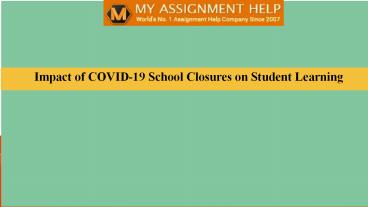Impact of COVID-19 School Closures on Student Learning - PowerPoint PPT Presentation
Title:
Impact of COVID-19 School Closures on Student Learning
Description:
As per eminent experts and prolific economics assignment help stalwarts, prolonged school closures associated with the coronavirus pandemic are likely to have a major negative effect on children’s education. – PowerPoint PPT presentation
Number of Views:145
Title: Impact of COVID-19 School Closures on Student Learning
1
Impact of COVID-19 School Closures on
Student Learning
2
(No Transcript)
3
As per eminent experts and prolific economics
assignment help stalwarts, prolonged school
closures associated with the coronavirus pandemic
are likely to have a major negative effect on
childrens education. It would leave some
students academically behind for years to come,
and even leading to the mean loss of income of
many families. In the weeks since public, as
well as private schools across the country,
remains closed to spread the deathly COVID-19,
one question that has repeatedly been asked to
the educators How would this affect the career
of the children? In short, no one knows for
sure. In this article, we have highlighted
certain unique ways researchers have found the
effect of school shutdown affecting the education
of children-
4
Some researchers believe summer vacation impedes
learning Talk of the top economics assignment
help forums since the closing of schools has been
how missing school whether voluntary or
involuntary, has negative consequences for
student learning. There is a long-standing line
of research in the education sector about summer
learning loss. According to such theory, kids
appear to regress academically during the annual
summer vacation. These seem like the best model
we can take into account what happens when
schools shut down for months at a time.
5
Literature especially focusses on the fact that
while kids from low-income families would start
behind academically, the gap is likely to
increase in summer. However, some argue that
children do not learn much for the entire summer,
and this is true for both poor and non-poor kids.
Thus, the vacation offers an opportunity to
close the achievement gap by providing poor kids
bonus school time over the summer.
6
- Impact of school closures vary as per childrens
socioeconomic backgrounds and geographic location
- As per the researchers, children of lower-income
families and the rural areas arent as likely to
have the internet as the children of middle-class
families. Some of them even do not have the fast
broadband internet required to stream online
classes and instructional videos. As such, they
are more likely to suffer more due to the
shutdowns of the schools. - On the other hand, it has been observed that
children from higher-income households are more
likely to have private tutors. They also have a
stay-at-home parent who can dedicate more time to
oversee the academic growth of their children
during school shutdowns.
7
- Other Crucial factors That Are Likely To
Influence Academic Achievement - A lack of access to classrooms and formalised
instructions arent the only factors affecting
the learning of the students right now.
Researchers point out, children whose family are
in various stress like losing jobs, low income,
the ongoing shortage of certain foods or supplies
along with the anxiety of Covid-19 are most
likely to be impacted. - Apart from that, a child who is forced to spend
all day, every day in an abusive household,
safety is a concern for him rather than
education.
8
This is nothing but bad news for us. If you look
at all the factors mentioned above, you will
notice that apart from the hindering of academic
achievement, there is also inequality amidst the
children which would only grow. For now, we
must, of course, defeat our immediate enemy,
which is the COVID-19. But, its never too early
to start thinking about the day after we declare
victory, whenever that might be.
9
Contact US
Phone Number - AUS -
61-3-4000-0033, UK - 44-121-285-4112, US -
1-515-393-6211
NZ - 64-98880721, UAE - 971-8000320360
Australia - Melbourne - 266/189 Queen St,
melbourne VIC 3000, Australia UK - London - 60
Windsor Avenue, London SW19 2RR, United
Kingdom US - New York - 447 Broadway 166, New
York, NY 10013, United States Dubai - Office - No
2415, 24th floor, Burjuman Business tower -
Dubai, UAE PO Box 127048 Mail ID -
contact_at_myassignmenthelp.com Website
-https//myassignmenthelp.com/economics_assignment
_help.html
10
(No Transcript)































